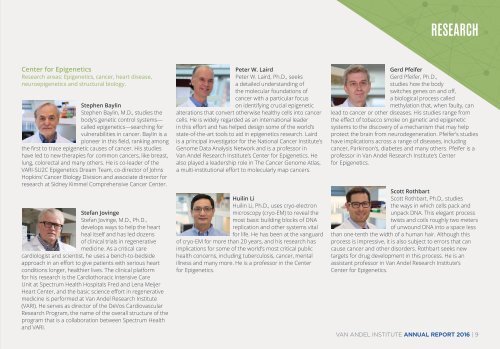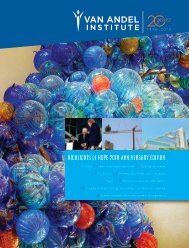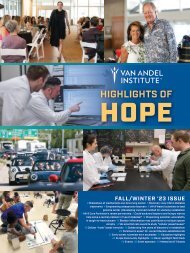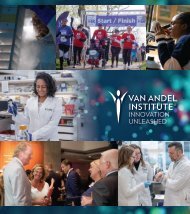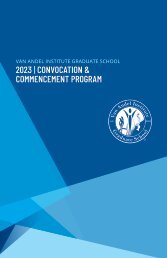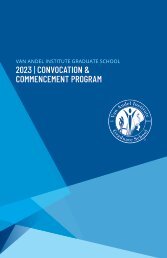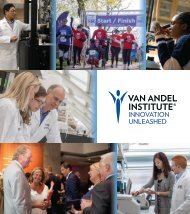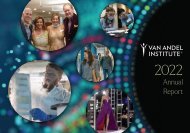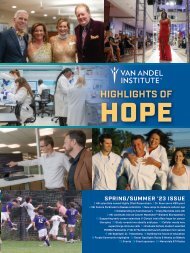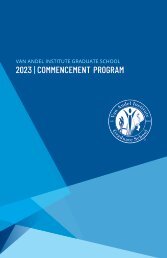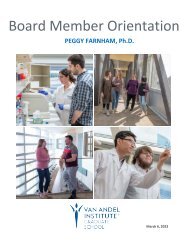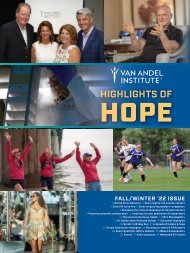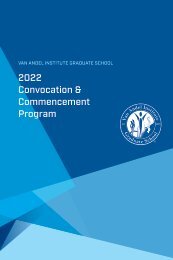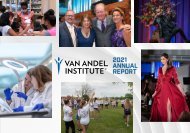2016 Annual Report
You also want an ePaper? Increase the reach of your titles
YUMPU automatically turns print PDFs into web optimized ePapers that Google loves.
RESEARCH<br />
Center for Epigenetics<br />
Research areas: Epigenetics, cancer, heart disease,<br />
neuroepigenetics and structural biology.<br />
Stephen Baylin<br />
Stephen Baylin, M.D., studies the<br />
body’s genetic control systems—<br />
called epigenetics—searching for<br />
vulnerabilities in cancer. Baylin is a<br />
pioneer in this field, ranking among<br />
the first to trace epigenetic causes of cancer. His studies<br />
have led to new therapies for common cancers, like breast,<br />
lung, colorectal and many others. He is co-leader of the<br />
VARI-SU2C Epigenetics Dream Team, co-director of Johns<br />
Hopkins’ Cancer Biology Division and associate director for<br />
research at Sidney Kimmel Comprehensive Cancer Center.<br />
Stefan Jovinge<br />
Stefan Jovinge, M.D., Ph.D.,<br />
develops ways to help the heart<br />
heal itself and has led dozens<br />
of clinical trials in regenerative<br />
medicine. As a critical care<br />
cardiologist and scientist, he uses a bench-to-bedside<br />
approach in an effort to give patients with serious heart<br />
conditions longer, healthier lives. The clinical platform<br />
for his research is the Cardiothoracic Intensive Care<br />
Unit at Spectrum Health Hospitals Fred and Lena Meijer<br />
Heart Center, and the basic science effort in regenerative<br />
medicine is performed at Van Andel Research Institute<br />
(VARI). He serves as director of the DeVos Cardiovascular<br />
Research Program, the name of the overall structure of the<br />
program that is a collaboration between Spectrum Health<br />
and VARI.<br />
Peter W. Laird<br />
Peter W. Laird, Ph.D., seeks<br />
a detailed understanding of<br />
the molecular foundations of<br />
cancer with a particular focus<br />
on identifying crucial epigenetic<br />
alterations that convert otherwise healthy cells into cancer<br />
cells. He is widely regarded as an international leader<br />
in this effort and has helped design some of the world’s<br />
state-of-the-art tools to aid in epigenetics research. Laird<br />
is a principal investigator for the National Cancer Institute’s<br />
Genome Data Analysis Network and is a professor in<br />
Van Andel Research Institute’s Center for Epigenetics. He<br />
also played a leadership role in The Cancer Genome Atlas,<br />
a multi-institutional effort to molecularly map cancers.<br />
Huilin Li<br />
Huilin Li, Ph.D., uses cryo-electron<br />
microscopy (cryo-EM) to reveal the<br />
most basic building blocks of DNA<br />
replication and other systems vital<br />
for life. He has been at the vanguard<br />
of cryo-EM for more than 20 years, and his research has<br />
implications for some of the world’s most critical public<br />
health concerns, including tuberculosis, cancer, mental<br />
illness and many more. He is a professor in the Center<br />
for Epigenetics.<br />
Gerd Pfeifer<br />
Gerd Pfeifer, Ph.D.,<br />
studies how the body<br />
switches genes on and off,<br />
a biological process called<br />
methylation that, when faulty, can<br />
lead to cancer or other diseases. His studies range from<br />
the effect of tobacco smoke on genetic and epigenetic<br />
systems to the discovery of a mechanism that may help<br />
protect the brain from neurodegeneration. Pfeifer’s studies<br />
have implications across a range of diseases, including<br />
cancer, Parkinson’s, diabetes and many others. Pfeifer is a<br />
professor in Van Andel Research Institute’s Center<br />
for Epigenetics.<br />
Scott Rothbart<br />
Scott Rothbart, Ph.D., studies<br />
the ways in which cells pack and<br />
unpack DNA. This elegant process<br />
twists and coils roughly two meters<br />
of unwound DNA into a space less<br />
than one-tenth the width of a human hair. Although this<br />
process is impressive, it is also subject to errors that can<br />
cause cancer and other disorders. Rothbart seeks new<br />
targets for drug development in this process. He is an<br />
assistant professor in Van Andel Research Institute’s<br />
Center for Epigenetics.<br />
VAN ANDEL INSTITUTE ANNUAL REPORT <strong>2016</strong> | 9


